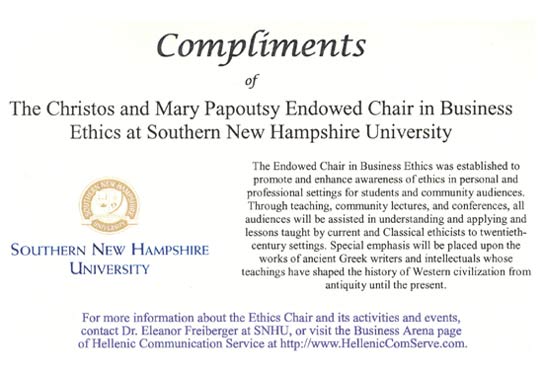 Christos Papoutsy
Christos Papoutsy
|
MADRID, Spain -- The “IOSCO” International Organization of Securities Commissions issued in early September its report on Analyst Conflicts of Interest.
The report examines the issues that must be considered by securities regulations in addressing conflicts faced by analysts.
The Analyst Project Team conducted an extensive survey in the jurisdictions the results of which are discussed in their report. The report recommends a statement of principles for addressing sell-side Securities Analyst Conflict of Interests.
Information is the lifeblood of modern capital markets.”
The flow of timely and accurate information among market participants promotes investors confidence in the markets, which aids in the flow of capital to business.” Accurate information is the oxygen to investors.
In the financial markets, research analysts play an important role in providing timely and accurate information to both the retail and institutional investors.
Conflict of interest has arisen in past years with some research analysts, also referred to assell-side analysts or securities analysts, employed by full-service investment firms.
Conflicts arise because the full-service investment firms often place these analysts in a potentially conflicting roll. These (“firms”) act as retail brokerage houses, while at the same time offering underwriting services utilizing the research analysts to assist, resulting in the potential conflict of interest. Two of IOSCO’s core objectives are “the protection of investors” and “ensuring that markets are fair, efficient and transparent.” To that end, the IOSCO’s project team concluded that the following key areas be considered when developing the high-level principals for addressing analyst conflicts of interest in order to insure investor protection.
1. Integrity – how do regulators ensure that analysts and the firms they work for act with integrity when producing research reports?
2. Conflicts of Interest – what conflicts need to be avoided, what conflicts need to be managed and when and in what form is disclosure of conflicts required?
3. Proficiency – should there be specific entry criteria or proficiency requirements to work as an analyst?
4. Investor education – what role should investor education play in addressing analyst conflict of interest?
Integrity is very important for investors confidence that analysts and firms act with integrity when producing research.
The technical committee agreed that the following points could be considered when addressing the issue of integrity.
Responsibility within the firm for the integrity of research reports; firm reporting structure; standards for producing research reports and the infrastructure necessary for implementing and monitoring these standards at a firm, SRO and regulation level; the way in which regulators carry out monitoring and enforcement of rules and regulations concerning conflicts of interest faced by analysts and their firms; ethical guidelines and education for firms and analysts to emphasize the importance of integrity and the responsibility of analysts and managers.
The IOSCO recommendations were eagerly awaited by the financial industry following a landmark $1.4 billion settlement in the United States between ten investment bankers and regulators over allegations of misleading stock research. IOSCO also called for barring analysts’ employees from promising corporate clients favorable research coverage or ratings in return for business or a ban on trading by analysts and their employees in securities and derivatives ahead of publishing research that would effect them.
For more information on IOSCO, log on to their web site at http://www.iosco.org/about/



